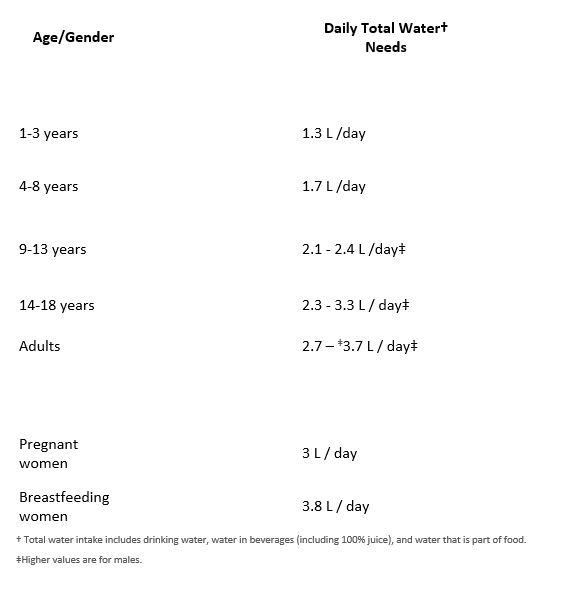Is 100% Orange Juice Hydrating?
100% orange juice naturally contains a high percentage of water – almost 90%. Orange juice also contains electrolytes, such as potassium, which aid in fluid balance. Orange juice may be a good beverage of choice to support fluid balance as it ranked higher than many other beverages on several measures of hydration in a recent study.1
What Does Water Do For You?
Water is critical for your health as it is the main component of all cells. We need water to help digest food, carry nutrients, remove waste, cushion organs and maintain fluid and electrolyte balance. Adequate hydration is extremely important for the body to maintain proper function including maintaining body temperature, regulating blood pressure, and transporting nutrients throughout your body.2 Adequate hydration may even support the appearance of healthy skin by improving skin elasticity.3
What Are Electrolytes?
Electrolytes include nutrients such as potassium, sodium, magnesium, and calcium. In fluids, these nutrients carry an electric charge which allow muscles to contract and nerves to transmit signals. Electrolytes are critical for the human body to function. Your heart could not beat without them.
Electrolytes are lost throughout the day with fluid losses, especially with sweat. Water does not contain electrolytes, so you must replace lost electrolytes by consuming foods that contain these nutrients. Drinking fluids, such as 100% orange juice, that contain water and electrolytes may help support hydration.
Electrolytes In 100% Orange Juice
Potassium is the major electrolyte within all cells. It helps to balance fluid in the body by having a strong relationship with sodium, the major electrolyte in the blood and outside of the cells. A normal blood pressure and heart beat depend on potassium. Your muscles and kidneys need potassium to work properly too. A healthy diet containing foods high in potassium and low in sodium may reduce the risk of high blood pressure, a risk factor for stroke and heart disease4 Most people do not get enough potassium and consume too much sodium – this may lead to high blood pressure.5 Orange juice is a good source of potassium. An 8-ounce glass of 100% orange juice provides 10% of the recommended Daily Value for potassium, similar to a large banana.6*
Magnesium is the fourth most abundant mineral in the body and is essential for normal muscle function, tissue building and bone development.7 Orange juice can contribute to magnesium intake with an 8-ounce glass having 6% of the recommended Daily Value for magnesium.*
Calcium is found in fortified varieties of orange juice. Calcium helps build and maintain strong bones and teeth.8 Fortified orange juice is an excellent source of calcium providing 30% of the recommended Daily Value, similar to the amount of calcium in an equal serving of milk.6*
Fluid Requirements
The amount of water needed each day varies by age, gender and life stage:2

Fluid needs are increased during physical activity, exposure to heat or cold, with increased altitude, wounds, persistent diarrhea or vomiting, fever, burns, certain medications (e.g. diuretics), and during pregnancy and breastfeeding.2,9
Symptoms of Dehydration
Dehydration may produce symptoms of thirst, fatigue, darkening and reduction of urine, and may affect cognition and motor control.2 Indeed, poor physical performance due to dehydration, such as with sports activities in warm weather, is well-documented.10 Help replenish your body after any physical activity with our Florida OJ Sports Drink, offering key nutrients, such as potassium, carbohydrates, and electrolytes.
DID YOU KNOW?
The human body comprises of approximately 75% water, which makes up approximately 60% of an adult’s body weight.2
Detailed Nutritional Information
Hydration and 100% Orange Juice
Most people can maintain adequate hydration by drinking when thirsty and eating a healthy diet.11 However, both underhydration and overhydration (due to lack of electrolytes by overconsuming water) can impair performance, particularly in athletes.11 Individuals may benefit from fluids with carbohydrates and/or electrolytes during extensive periods of exercise, and beverages that appeal to taste preferences may encourage individuals to drink.11 To support hydration during prolonged activity, diluted orange juice may be a good choice.
A recent study by Maughan and others reported 100% orange juice positively affected several measures of hydration.1 Compared to many other beverages, including water and sports drinks, participants consuming orange juice had lower urine output and a higher net fluid balance at various timepoints after consumption. In this study, orange juice ranked among one of the highest beverages on a beverage hydration index scale together with oral rehydration solutions and milk. Furthermore, net potassium balance was highest with orange juice and milk consumption.
* Values based on a 2000 calorie diet. Nutrient values may vary based on manufacturer, brand, and product types.
References
- Maughan et al. Am J Clin Nutr. 2018;103:717-723.
- Food and Nutrition Board, Institute of Medicine. Dietary Reference Intakes for Water, Potassium, Sodium, Chloride, and Sulfate. Washington, D.C.: National Academy Press.
- Palma et al. Clinical, Cosmetic and Investigational Dermatology 2015:8 413–421.
- Canadian Food Inspection Agency, 2018 May 11. Health Claims: Acceptable disease risk reduction claims and therapeutic claims.
- USDA/DHHS. 2015-2020 Dietary Guidelines for Americans.
- USDA National Nutrient Database for Standard Reference, Release 28 (slightly revised). US Department of Agriculture, Agricultural Research Service, Nutrient Data Laboratory; May 2016.
- Government of Canada, 2019. Acceptable Nutrient Function Claims, Canadian Food Inspection Agency.
- Government of Canada, 2019. Acceptable Nutrient Function Claims, Canadian Food Inspection Agency.
- The A.S.P.E.N. Adult Nutrition Support Core Curriculum, 2nd Ed. American Society of Parental and Enteral Nutrition. 2012; pgs 356, 401-402.
- Sawka et al. Sports Med (2015) 45 (Suppl 1):S51–S60.
- McDermott et al. J Athletic Training. 2017; 52(9):877–895.